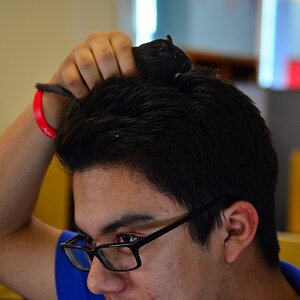Ever seen that movie Pi? I like it when he says, "Restate my basic assumptions:"
It's been a full year since I first grabbed up that camera from my house and started taking pictures all day every day. I've looked around alot on the internet for photographers, found forums, loaded my Live Journal friends list with photographers, and done random studies of information people put up. I've taken four college drawing and design classes. And now I'm gonna be learning all about communication design. In addition I'll be in a photography class next semester. Now any successful person without a college degree can tell you that you're wasting your time in college. It's true that if I tried hard enough I could become a successful photographer or artist/designer. But I'd rather increase my statistical chance of success by going to school. Seems kinda like the lazy man's path to hard work.
Nonetheless, I've learned a bit since I picked up that camera. So now I restate my basic assumptions on photography.
Realism in art is less important now that the camera has come along. Those who spent a year working on a masterpiece of painting something to look as real as possible are now overshadowed by those with no artistic experience who can pick up the devil box and steal several souls every second. Now knowing this, what makes photography an art? What makes anything art? It looks pretty, that's what makes it good.
There are two simple paths to artistic photography that come to mind. Taking pictures of other people's work, usually this is architecture and saying, "Wow, don't you love my photo?"
The second is taking pictures of oneself nonstop. This is a simple act of vanity. Usually the person turns their head in an awkward position to show his or her best side which in turn can get away with being called artistic. But once again, this is simple vanity, get over yourself. Either that or stop being insecure and forcing people to look at it and have no choice but to say, "Wow, that's a good picture - Ur Pritee"
The purpose of black and white photography is to get a feel for composition. Its artistic use is to set up a good composition that is visually appealing where color would have otherwise distracted. It helps to think of a photo first as a blank canvas. Say someone paints three squares on it and now it is interesting. They set up the places of the squares to be visually appealing. With a photo, you could simply place three cubes or squares down and take a picture of them to look exactly like the painting. That is photo composition.
Except its a bit harder now isn't it. Because so many things are distracting in any given picture. That's why we look for principles of design that will make a chaotic composition seem organized and therefore visually appealing. Now you've taken a picture of a cell phone, a wallet, and a CD case, but now they are arranged like that painting was and have the composition.
As for color, color can distract, which is why black and white photography is so much easier. The natural state of things shoves so many colors in your face, but black and white allows you to force the natural state of things to be two opposing shades that look good together. Now you don't have to worry about color as you look for composition.
But now you want to use color. That cell phone is a horrible puke-green and the wallet is an orange-pink. Black and white, they look good together, but color they look terrible. So say you spray-painted the wallet and cell phone blue and placed them on an orange sheet of paper and took a picture. Now it'd be more visually appealing.
Another form of photography art that works is landscapes. Usually these are breath-taking scenes that make us gasp and find ourselves constantly amazed with the wonders this world can provide us. A theory on why alot of these work is because nature has alot of color that naturally goes well together. I assume that's in the basic fundamentals of color and was this way because of how nature always works out.
The blue sky with white clouds above the green trees above the blue/black lake. Blue and green are analogous and white and black are neutral.
And again, because landscape pictures are easy to work out with color, it's all about finding the composition. What makes some landscape pictures incredible is the unusual colors that nature present to those who wait for the right lighting.
Then of course, there is portraiture. Where there doesn't need to be any real composition because the main appeal in the pictures are the people. Just by taking a picture of a person adds instant emotional appeal, you wonder about the person. A black and white photo of a person adds to the mood but allows for easy composition aloong with the emotional appeal. And then color you could do something like match up colors that look well together with a good composition and get all of those goodies at once. Then you could take a good composition of perfect colors of a person looking over a fantastic landscape and you've got photography perfection right?
Beauty is in the eye of the beholder.
What I like to do are macro photos. Just as black and white simplifies a composition, macro photos take out alot of the chaos by getting all close up. The landscape around here sucks so I feel like I have no choice. I don't plan my photos so I can't get people to pose for me all the time. But occasionally I get good moments.
Then you have added effects like a blur in the background or up front and then artistic additions to the photos like a blank face in a dark room. Those are all things I find complicated to think about but will approach as I master more of the compositional techniques.
And there's more but of course, these are my basic assumptions that I can remember right now.
It's been a full year since I first grabbed up that camera from my house and started taking pictures all day every day. I've looked around alot on the internet for photographers, found forums, loaded my Live Journal friends list with photographers, and done random studies of information people put up. I've taken four college drawing and design classes. And now I'm gonna be learning all about communication design. In addition I'll be in a photography class next semester. Now any successful person without a college degree can tell you that you're wasting your time in college. It's true that if I tried hard enough I could become a successful photographer or artist/designer. But I'd rather increase my statistical chance of success by going to school. Seems kinda like the lazy man's path to hard work.
Nonetheless, I've learned a bit since I picked up that camera. So now I restate my basic assumptions on photography.
Realism in art is less important now that the camera has come along. Those who spent a year working on a masterpiece of painting something to look as real as possible are now overshadowed by those with no artistic experience who can pick up the devil box and steal several souls every second. Now knowing this, what makes photography an art? What makes anything art? It looks pretty, that's what makes it good.
There are two simple paths to artistic photography that come to mind. Taking pictures of other people's work, usually this is architecture and saying, "Wow, don't you love my photo?"
The second is taking pictures of oneself nonstop. This is a simple act of vanity. Usually the person turns their head in an awkward position to show his or her best side which in turn can get away with being called artistic. But once again, this is simple vanity, get over yourself. Either that or stop being insecure and forcing people to look at it and have no choice but to say, "Wow, that's a good picture - Ur Pritee"
The purpose of black and white photography is to get a feel for composition. Its artistic use is to set up a good composition that is visually appealing where color would have otherwise distracted. It helps to think of a photo first as a blank canvas. Say someone paints three squares on it and now it is interesting. They set up the places of the squares to be visually appealing. With a photo, you could simply place three cubes or squares down and take a picture of them to look exactly like the painting. That is photo composition.
Except its a bit harder now isn't it. Because so many things are distracting in any given picture. That's why we look for principles of design that will make a chaotic composition seem organized and therefore visually appealing. Now you've taken a picture of a cell phone, a wallet, and a CD case, but now they are arranged like that painting was and have the composition.
As for color, color can distract, which is why black and white photography is so much easier. The natural state of things shoves so many colors in your face, but black and white allows you to force the natural state of things to be two opposing shades that look good together. Now you don't have to worry about color as you look for composition.
But now you want to use color. That cell phone is a horrible puke-green and the wallet is an orange-pink. Black and white, they look good together, but color they look terrible. So say you spray-painted the wallet and cell phone blue and placed them on an orange sheet of paper and took a picture. Now it'd be more visually appealing.
Another form of photography art that works is landscapes. Usually these are breath-taking scenes that make us gasp and find ourselves constantly amazed with the wonders this world can provide us. A theory on why alot of these work is because nature has alot of color that naturally goes well together. I assume that's in the basic fundamentals of color and was this way because of how nature always works out.
The blue sky with white clouds above the green trees above the blue/black lake. Blue and green are analogous and white and black are neutral.
And again, because landscape pictures are easy to work out with color, it's all about finding the composition. What makes some landscape pictures incredible is the unusual colors that nature present to those who wait for the right lighting.
Then of course, there is portraiture. Where there doesn't need to be any real composition because the main appeal in the pictures are the people. Just by taking a picture of a person adds instant emotional appeal, you wonder about the person. A black and white photo of a person adds to the mood but allows for easy composition aloong with the emotional appeal. And then color you could do something like match up colors that look well together with a good composition and get all of those goodies at once. Then you could take a good composition of perfect colors of a person looking over a fantastic landscape and you've got photography perfection right?
Beauty is in the eye of the beholder.
What I like to do are macro photos. Just as black and white simplifies a composition, macro photos take out alot of the chaos by getting all close up. The landscape around here sucks so I feel like I have no choice. I don't plan my photos so I can't get people to pose for me all the time. But occasionally I get good moments.
Then you have added effects like a blur in the background or up front and then artistic additions to the photos like a blank face in a dark room. Those are all things I find complicated to think about but will approach as I master more of the compositional techniques.
And there's more but of course, these are my basic assumptions that I can remember right now.


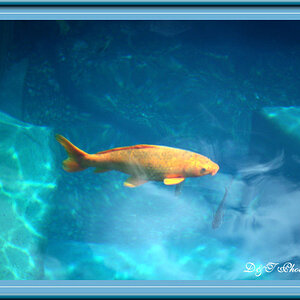
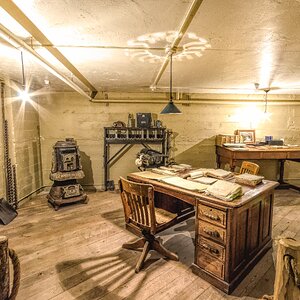
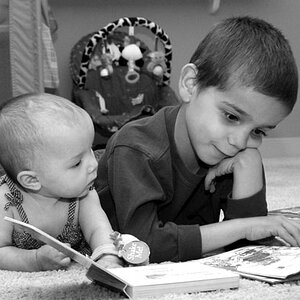

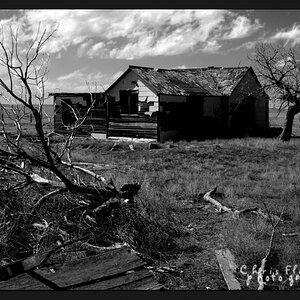
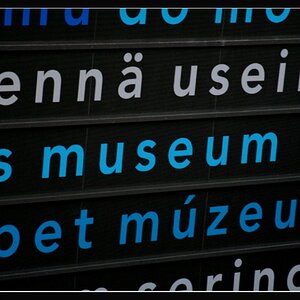
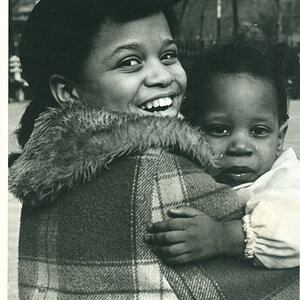

![[No title]](/data/xfmg/thumbnail/35/35878-753a9d58c095f0e1aaa96d03c025f6ce.jpg?1619737205)


